5_Russia_Energy_Leverage_China
- 格式:pdf
- 大小:48.39 KB
- 文档页数:8
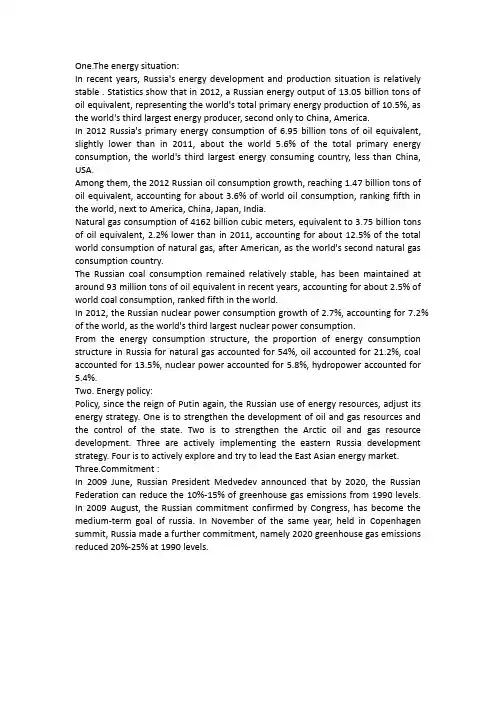
One.The energy situation:In recent years, Russia's energy development and production situation is relatively stable . Statistics show that in 2012, a Russian energy output of 13.05 billion tons of oil equivalent, representing the world's total primary energy production of 10.5%, as the world's third largest energy producer, second only to China, America.In 2012 Russia's primary energy consumption of 6.95 billion tons of oil equivalent, slightly lower than in 2011, about the world 5.6% of the total primary energy consumption, the world's third largest energy consuming country, less than China, USA.Among them, the 2012 Russian oil consumption growth, reaching 1.47 billion tons of oil equivalent, accounting for about 3.6% of world oil consumption, ranking fifth in the world, next to America, China, Japan, India.Natural gas consumption of 4162 billion cubic meters, equivalent to 3.75 billion tons of oil equivalent, 2.2% lower than in 2011, accounting for about 12.5% of the total world consumption of natural gas, after American, as the world's second natural gas consumption country.The Russian coal consumption remained relatively stable, has been maintained at around 93 million tons of oil equivalent in recent years, accounting for about 2.5% of world coal consumption, ranked fifth in the world.In 2012, the Russian nuclear power consumption growth of 2.7%, accounting for 7.2% of the world, as the world's third largest nuclear power consumption.From the energy consumption structure, the proportion of energy consumption structure in Russia for natural gas accounted for 54%, oil accounted for 21.2%, coal accounted for 13.5%, nuclear power accounted for 5.8%, hydropower accounted for 5.4%.Two. Energy policy:Policy, since the reign of Putin again, the Russian use of energy resources, adjust its energy strategy. One is to strengthen the development of oil and gas resources and the control of the state. Two is to strengthen the Arctic oil and gas resource development. Three are actively implementing the eastern Russia development strategy. Four is to actively explore and try to lead the East Asian energy market. mitment :In 2009 June, Russian President Medvedev announced that by 2020, the Russian Federation can reduce the 10%-15% of greenhouse gas emissions from 1990 levels. In 2009 August, the Russian commitment confirmed by Congress, has become the medium-term goal of russia. In November of the same year, held in Copenhagen summit, Russia made a further commitment, namely 2020 greenhouse gas emissions reduced 20%-25% at 1990 levels.。
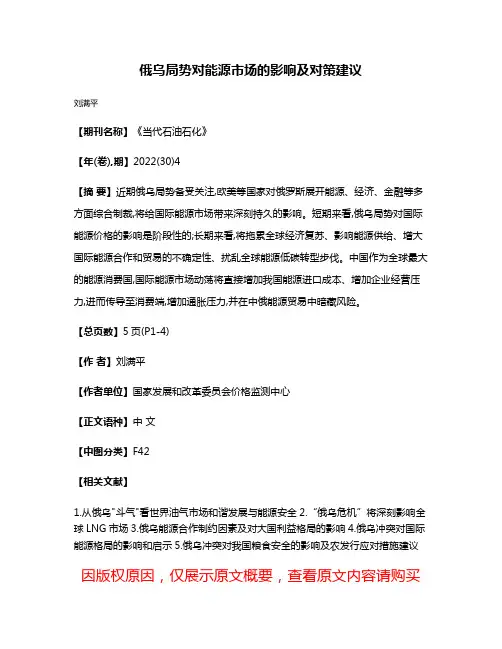
俄乌局势对能源市场的影响及对策建议
刘满平
【期刊名称】《当代石油石化》
【年(卷),期】2022(30)4
【摘要】近期俄乌局势备受关注,欧美等国家对俄罗斯展开能源、经济、金融等多方面综合制裁,将给国际能源市场带来深刻持久的影响。
短期来看,俄乌局势对国际能源价格的影响是阶段性的;长期来看,将拖累全球经济复苏、影响能源供给、增大国际能源合作和贸易的不确定性、扰乱全球能源低碳转型步伐。
中国作为全球最大的能源消费国,国际能源市场动荡将直接增加我国能源进口成本、增加企业经营压力,进而传导至消费端,增加通胀压力,并在中俄能源贸易中暗藏风险。
【总页数】5页(P1-4)
【作者】刘满平
【作者单位】国家发展和改革委员会价格监测中心
【正文语种】中文
【中图分类】F42
【相关文献】
1.从俄乌"斗气"看世界油气市场和谐发展与能源安全
2.“俄乌危机”将深刻影响全球LNG市场
3.俄乌能源合作制约因素及对大国利益格局的影响
4.俄乌冲突对国际能源格局的影响和启示
5.俄乌冲突对我国粮食安全的影响及农发行应对措施建议
因版权原因,仅展示原文概要,查看原文内容请购买。
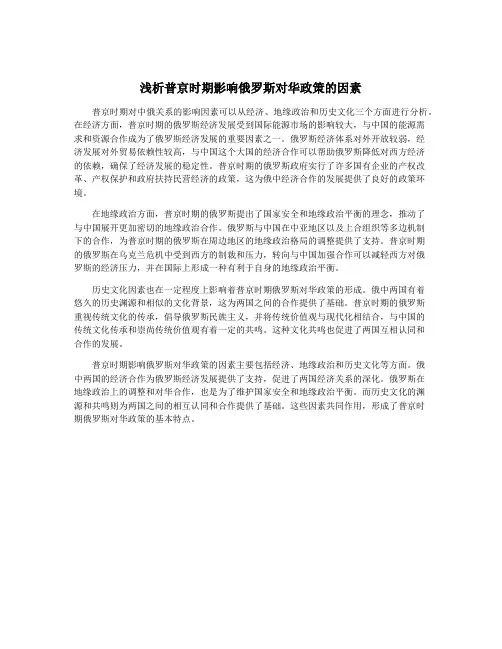
浅析普京时期影响俄罗斯对华政策的因素普京时期对中俄关系的影响因素可以从经济、地缘政治和历史文化三个方面进行分析。
在经济方面,普京时期的俄罗斯经济发展受到国际能源市场的影响较大,与中国的能源需求和资源合作成为了俄罗斯经济发展的重要因素之一。
俄罗斯经济体系对外开放较弱,经济发展对外贸易依赖性较高,与中国这个大国的经济合作可以帮助俄罗斯降低对西方经济的依赖,确保了经济发展的稳定性。
普京时期的俄罗斯政府实行了许多国有企业的产权改革、产权保护和政府扶持民营经济的政策,这为俄中经济合作的发展提供了良好的政策环境。
在地缘政治方面,普京时期的俄罗斯提出了国家安全和地缘政治平衡的理念,推动了与中国展开更加密切的地缘政治合作。
俄罗斯与中国在中亚地区以及上合组织等多边机制下的合作,为普京时期的俄罗斯在周边地区的地缘政治格局的调整提供了支持。
普京时期的俄罗斯在乌克兰危机中受到西方的制裁和压力,转向与中国加强合作可以减轻西方对俄罗斯的经济压力,并在国际上形成一种有利于自身的地缘政治平衡。
历史文化因素也在一定程度上影响着普京时期俄罗斯对华政策的形成。
俄中两国有着悠久的历史渊源和相似的文化背景,这为两国之间的合作提供了基础。
普京时期的俄罗斯重视传统文化的传承,倡导俄罗斯民族主义,并将传统价值观与现代化相结合,与中国的传统文化传承和崇尚传统价值观有着一定的共鸣。
这种文化共鸣也促进了两国互相认同和合作的发展。
普京时期影响俄罗斯对华政策的因素主要包括经济、地缘政治和历史文化等方面。
俄中两国的经济合作为俄罗斯经济发展提供了支持,促进了两国经济关系的深化。
俄罗斯在地缘政治上的调整和对华合作,也是为了维护国家安全和地缘政治平衡。
而历史文化的渊源和共鸣则为两国之间的相互认同和合作提供了基础。
这些因素共同作用,形成了普京时期俄罗斯对华政策的基本特点。
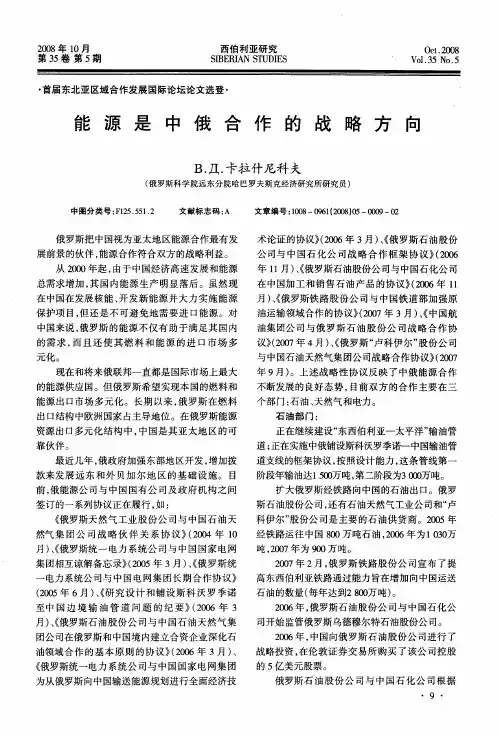
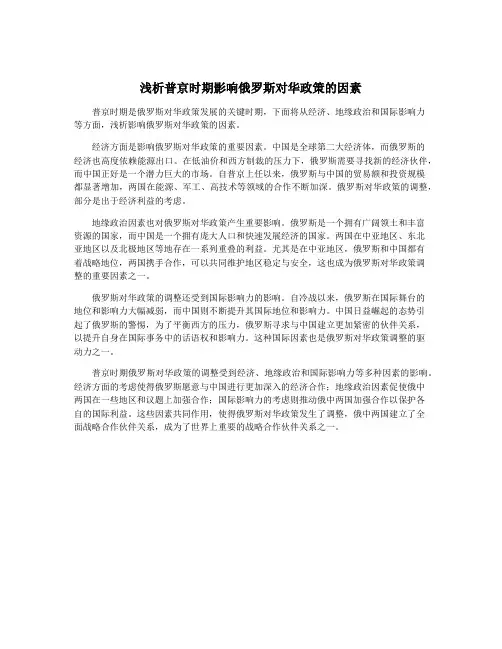
浅析普京时期影响俄罗斯对华政策的因素普京时期是俄罗斯对华政策发展的关键时期,下面将从经济、地缘政治和国际影响力等方面,浅析影响俄罗斯对华政策的因素。
经济方面是影响俄罗斯对华政策的重要因素。
中国是全球第二大经济体,而俄罗斯的经济也高度依赖能源出口。
在低油价和西方制裁的压力下,俄罗斯需要寻找新的经济伙伴,而中国正好是一个潜力巨大的市场。
自普京上任以来,俄罗斯与中国的贸易额和投资规模都显著增加,两国在能源、军工、高技术等领域的合作不断加深。
俄罗斯对华政策的调整,部分是出于经济利益的考虑。
地缘政治因素也对俄罗斯对华政策产生重要影响。
俄罗斯是一个拥有广阔领土和丰富资源的国家,而中国是一个拥有庞大人口和快速发展经济的国家。
两国在中亚地区、东北亚地区以及北极地区等地存在一系列重叠的利益。
尤其是在中亚地区,俄罗斯和中国都有着战略地位,两国携手合作,可以共同维护地区稳定与安全,这也成为俄罗斯对华政策调整的重要因素之一。
俄罗斯对华政策的调整还受到国际影响力的影响。
自冷战以来,俄罗斯在国际舞台的地位和影响力大幅减弱,而中国则不断提升其国际地位和影响力。
中国日益崛起的态势引起了俄罗斯的警惕,为了平衡西方的压力,俄罗斯寻求与中国建立更加紧密的伙伴关系,以提升自身在国际事务中的话语权和影响力。
这种国际因素也是俄罗斯对华政策调整的驱动力之一。
普京时期俄罗斯对华政策的调整受到经济、地缘政治和国际影响力等多种因素的影响。
经济方面的考虑使得俄罗斯愿意与中国进行更加深入的经济合作;地缘政治因素促使俄中两国在一些地区和议题上加强合作;国际影响力的考虑则推动俄中两国加强合作以保护各自的国际利益。
这些因素共同作用,使得俄罗斯对华政策发生了调整,俄中两国建立了全面战略合作伙伴关系,成为了世界上重要的战略合作伙伴关系之一。
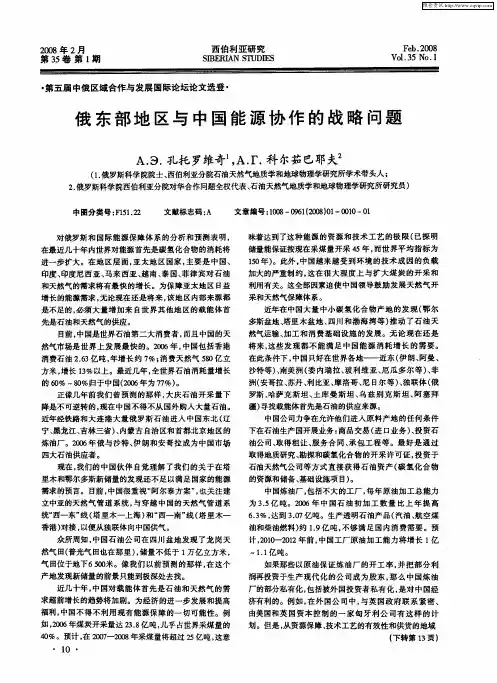
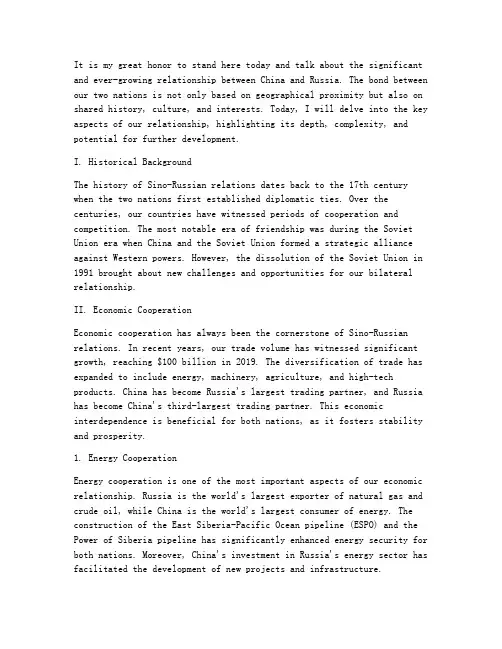
It is my great honor to stand here today and talk about the significant and ever-growing relationship between China and Russia. The bond between our two nations is not only based on geographical proximity but also on shared history, culture, and interests. Today, I will delve into the key aspects of our relationship, highlighting its depth, complexity, and potential for further development.I. Historical BackgroundThe history of Sino-Russian relations dates back to the 17th century when the two nations first established diplomatic ties. Over the centuries, our countries have witnessed periods of cooperation and competition. The most notable era of friendship was during the Soviet Union era when China and the Soviet Union formed a strategic alliance against Western powers. However, the dissolution of the Soviet Union in 1991 brought about new challenges and opportunities for our bilateral relationship.II. Economic CooperationEconomic cooperation has always been the cornerstone of Sino-Russian relations. In recent years, our trade volume has witnessed significant growth, reaching $100 billion in 2019. The diversification of trade has expanded to include energy, machinery, agriculture, and high-tech products. China has become Russia's largest trading partner, and Russia has become China's third-largest trading partner. This economic interdependence is beneficial for both nations, as it fosters stability and prosperity.1. Energy CooperationEnergy cooperation is one of the most important aspects of our economic relationship. Russia is the world's largest exporter of natural gas and crude oil, while China is the world's largest consumer of energy. The construction of the East Siberia-Pacific Ocean pipeline (ESPO) and the Power of Siberia pipeline has significantly enhanced energy security for both nations. Moreover, China's investment in Russia's energy sector has facilitated the development of new projects and infrastructure.2. Industrial CooperationIndustrial cooperation has also been a significant driver of our economic relationship. China's rapid industrialization has created a huge demand for Russian raw materials and technologies. In return, Russia has gained access to China's vast market and advanced manufacturing capabilities. This win-win cooperation has led to the establishment of joint ventures and the transfer of technology.III. Political and Security CooperationThe political and security cooperation between China and Russia is based on the principles of mutual respect, equality, and mutual benefit. Our nations share a common stance on many international issues, such as the fight against terrorism, the peaceful resolution of disputes, and the maintenance of international order. The following aspects highlight our strong political and security cooperation:1. Bilateral DialoguesOur countries hold regular bilateral dialogues, including the Strategic Security Dialogue, the Foreign Ministers' Meeting, and the Prime Ministers' Meeting. These dialogues facilitate the exchange of views on various issues and strengthen mutual understanding.2. Multilateral CooperationChina and Russia actively participate in multilateral organizations, such as the United Nations, the Shanghai Cooperation Organization (SCO), and the BRICS. Our nations have jointly proposed and promoted many important initiatives, such as the Belt and Road Initiative (BRI) and the Eurasian Economic Union (EEU). These initiatives aim to enhance regional connectivity and economic integration.3. Security CooperationIn the realm of security, China and Russia have conducted joint military exercises and intelligence sharing. These efforts have enhanced our military capabilities and provided a solid foundation for regional stability.IV. Cultural and People-to-People ExchangesCultural and people-to-people exchanges have played a crucial role in fostering friendship and understanding between our nations. Thefollowing aspects highlight our cultural cooperation:1. Education and ScienceOur countries have established numerous educational and scientific institutions that facilitate the exchange of knowledge and expertise. Joint research projects and student exchanges have deepened our understanding of each other's cultures and technologies.2. TourismTourism has become an increasingly popular way for people to learn about each other's cultures. Each year, thousands of tourists visit Russia and China, contributing to the growth of our cultural and economic ties.V. Challenges and ProspectsDespite the strong foundation of our relationship, there are still challenges that need to be addressed. The following challenges and prospects are worth mentioning:1. Challenges- Political and economic uncertainties: Both nations face political and economic challenges that could impact our bilateral relationship.- Geopolitical tensions: The rise of new geopolitical tensions could affect the stability of our region.- Diversification of trade: We need to continue diversifying our trade to reduce dependence on certain sectors.2. Prospects- Strengthening strategic partnership: Our countries can further strengthen our strategic partnership to address global challenges.- Deepening economic cooperation: We can continue to expand our economic cooperation to create more job opportunities and prosperity.- Enhancing cultural exchanges: We can deepen our cultural and people-to-people exchanges to foster mutual understanding and friendship.In conclusion, the Sino-Russian relationship is a unique and valuable partnership. It is built on shared history, culture, and interests, and has great potential for further development. By addressing challenges and seizing opportunities, we can ensure that our relationship continues to grow and thrive for the benefit of both nations and the world.Thank you.。
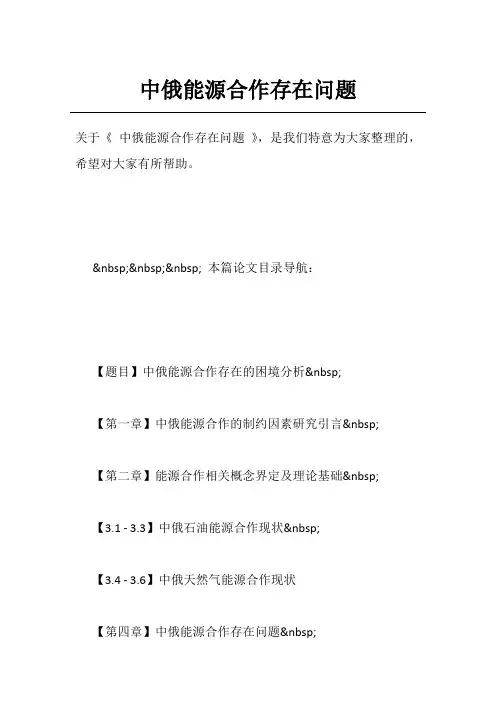
中俄能源合作存在问题关于《中俄能源合作存在问题》,是我们特意为大家整理的,希望对大家有所帮助。
本篇论文目录导航:【题目】中俄能源合作存在的困境分析 【第一章】中俄能源合作的制约因素研究引言 【第二章】能源合作相关概念界定及理论基础 【3.1 - 3.3】中俄石油能源合作现状 【3.4 - 3.6】中俄天然气能源合作现状【第四章】中俄能源合作存在问题 【第五章】加强中俄能源合作的对策建议 【结论/参考文献】中俄能源合作改善研究结论与参考文献4 中俄能源合作存在问题4.1 俄方国内投资环境有待改善4.1.1 忧虑中国的崛起触及俄方国际利益随着中国经济的崛起,中国已经成为世界第二大经济体,世界上的政治地位也在逐渐增强。
而俄罗斯在经济上受到西方的制裁已经出现增长的瓶颈,世界政治地位影响力也受到一定的影响,再这样的情况之下,作为传统发达国家的俄罗斯面对中国的经济,政治的崛起,有部分俄罗斯人忧虑中国的崛起。
中俄能源进行合作,相当于支持中国的生产而忽视俄罗斯经济发展,完全符合中国的能源战略,促进中国的经济发展对俄罗斯形成一个新的威胁。
这样的声音对俄罗斯能源出口中国受到一定影响。
过多的向中国输送石油和天然气,会促进出口市场的单一化,能源输出会对中国市场形成过度依赖。
这样的观点和担忧或许是对民族主义人士是对的,但是作为俄罗斯执政者来过,与中国能源合作才是长久之事,目前虽然受到乌克兰危机的政治事件影响,俄罗斯受到西方国家的经济制裁,西方国家及乌克兰都在逐渐摆脱对俄罗斯能源依靠。
其次中国企业和中国的劳动力进入俄罗斯,在中国劳动力和俄罗斯人民相处中多少会有文化冲突,中国劳动力对冲击当地就业市场,对本就部分失业率高地区形成新的威胁,从而导致这部分俄罗斯人民的抱怨。
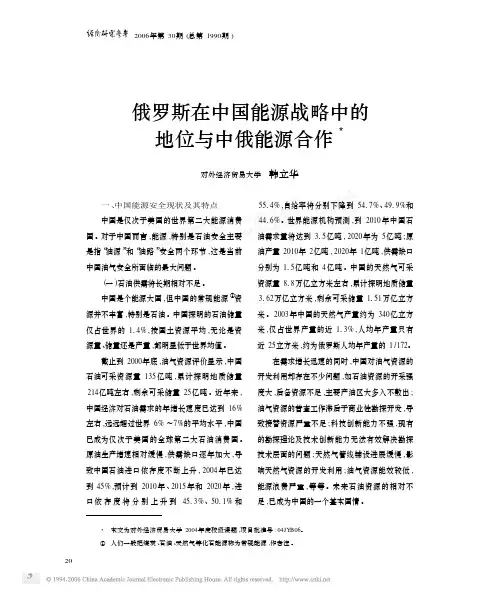
20 俄罗斯在中国能源战略中的地位与中俄能源合作3对外经济贸易大学 韩立华3 本文为对外经济贸易大学2004年度校级课题,项目批准号:04JY B06。
① 人们一般把煤炭、石油、天然气等化石能源称为常规能源,作者注。
一、中国能源安全现状及其特点中国是仅次于美国的世界第二大能源消费国。
对于中国而言,能源,特别是石油安全主要是指“油源”和“油路”安全两个环节,这是当前中国油气安全所面临的最大问题。
(一)石油供需将长期相对不足。
中国是个能源大国,但中国的常规能源①资源并不丰富,特别是石油。
中国探明的石油储量仅占世界的114%,按国土资源平均,无论是资源量、储量还是产量,都明显低于世界均值。
截止到2000年底,油气资源评价显示,中国石油可采资源量135亿吨,累计探明地质储量214亿吨左右,剩余可采储量25亿吨。
近年来,中国经济对石油需求的年增长速度已达到16%左右,远远超过世界6%~7%的平均水平,中国已成为仅次于美国的全球第二大石油消费国。
原油生产增速相对缓慢,供需缺口逐年加大,导致中国石油进口依存度不断上升,2004年已达到45%,预计到2010年、2015年和2020年,进口依存度将分别上升到4513%、5011%和5514%,自给率将分别下降到17%、4919%和4416%。
世界能源机构预测,到2010年中国石油需求量将达到315亿吨,2020年为5亿吨;原油产量2010年2亿吨,2020年1亿吨,供需缺口分别为115亿吨和4亿吨。
中国的天然气可采资源量818万亿立方米左右,累计探明地质储量3162万亿立方米,剩余可采储量1151万亿立方米。
2003年中国的天然气产量约为340亿立方米,仅占世界产量的近113%,人均年产量只有近25立方米,约为俄罗斯人均年产量的1/172。
在需求增长迅速的同时,中国对油气资源的开发利用却存在不少问题,如石油资源的开采强度大,后备资源不足,主要产油区大多入不敷出;油气资源的普查工作滞后于商业性勘探开发,导致接替资源严重不足;科技创新能力不强,现有的勘探理论及技术创新能力无法有效解决勘探技术层面的问题;天然气管线铺设进展缓慢,影响天然气资源的开发利用;油气资源能效较低,能源浪费严重,等等。
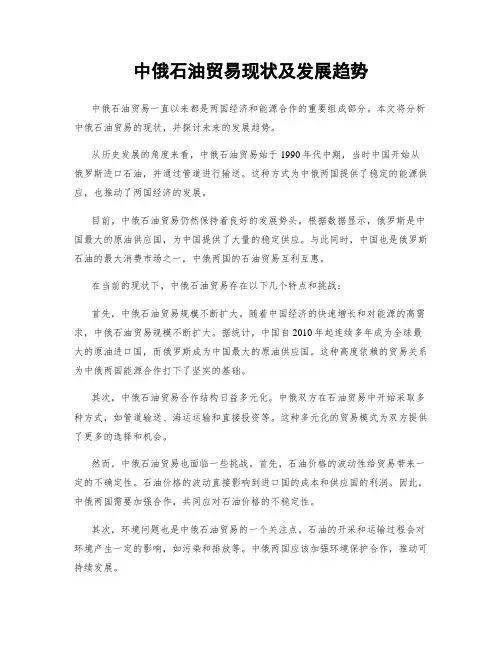
中俄石油贸易现状及发展趋势中俄石油贸易一直以来都是两国经济和能源合作的重要组成部分。
本文将分析中俄石油贸易的现状,并探讨未来的发展趋势。
从历史发展的角度来看,中俄石油贸易始于1990年代中期,当时中国开始从俄罗斯进口石油,并通过管道进行输送。
这种方式为中俄两国提供了稳定的能源供应,也推动了两国经济的发展。
目前,中俄石油贸易仍然保持着良好的发展势头。
根据数据显示,俄罗斯是中国最大的原油供应国,为中国提供了大量的稳定供应。
与此同时,中国也是俄罗斯石油的最大消费市场之一,中俄两国的石油贸易互利互惠。
在当前的现状下,中俄石油贸易存在以下几个特点和挑战:首先,中俄石油贸易规模不断扩大。
随着中国经济的快速增长和对能源的高需求,中俄石油贸易规模不断扩大。
据统计,中国自2010年起连续多年成为全球最大的原油进口国,而俄罗斯成为中国最大的原油供应国。
这种高度依赖的贸易关系为中俄两国能源合作打下了坚实的基础。
其次,中俄石油贸易合作结构日益多元化。
中俄双方在石油贸易中开始采取多种方式,如管道输送、海运运输和直接投资等。
这种多元化的贸易模式为双方提供了更多的选择和机会。
然而,中俄石油贸易也面临一些挑战。
首先,石油价格的波动性给贸易带来一定的不确定性。
石油价格的波动直接影响到进口国的成本和供应国的利润。
因此,中俄两国需要加强合作,共同应对石油价格的不稳定性。
其次,环境问题也是中俄石油贸易的一个关注点。
石油的开采和运输过程会对环境产生一定的影响,如污染和排放等。
中俄两国应该加强环境保护合作,推动可持续发展。
展望未来,中俄石油贸易有望继续取得进一步发展。
首先,中国经济的持续增长将推动对石油的需求继续增加。
中国作为世界上最大的能源消费国之一,对石油的需求将继续增长。
这将为中俄石油贸易提供更多的机会。
其次,中俄能源合作的深化也将助力中俄石油贸易的发展。
中俄两国在能源领域有着广泛的合作基础,包括能源互联互通、项目合作和技术交流等。
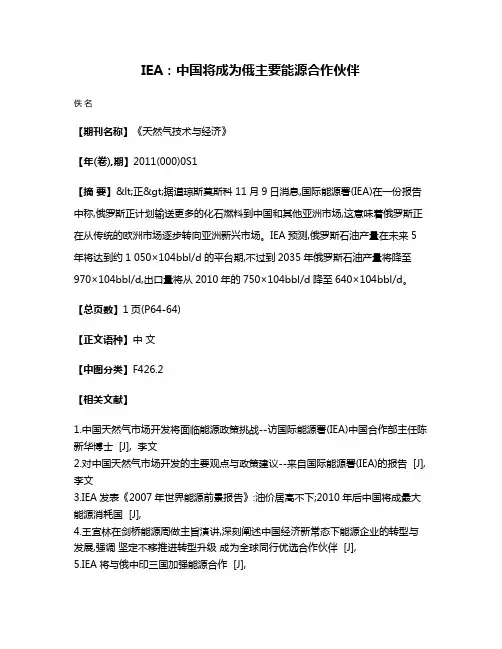
IEA:中国将成为俄主要能源合作伙伴
佚名
【期刊名称】《天然气技术与经济》
【年(卷),期】2011(000)0S1
【摘要】<正>据道琼斯莫斯科11月9日消息,国际能源署(IEA)在一份报告中称,俄罗斯正计划输送更多的化石燃料到中国和其他亚洲市场,这意味着俄罗斯正在从传统的欧洲市场逐步转向亚洲新兴市场。
IEA预测,俄罗斯石油产量在未来5
年将达到约1 050×104bbl/d的平台期,不过到2035年俄罗斯石油产量将降至970×104bbl/d,出口量将从2010年的750×104bbl/d降至640×104bbl/d。
【总页数】1页(P64-64)
【正文语种】中文
【中图分类】F426.2
【相关文献】
1.中国天然气市场开发将面临能源政策挑战--访国际能源署(IEA)中国合作部主任陈新华博士 [J], 李文
2.对中国天然气市场开发的主要观点与政策建议--来自国际能源署(IEA)的报告 [J], 李文
3.IEA发表《2007年世界能源前景报告》:油价居高不下;2010年后中国将成最大能源消耗国 [J],
4.王宜林在剑桥能源周做主旨演讲,深刻阐述中国经济新常态下能源企业的转型与发展,强调坚定不移推进转型升级成为全球同行优选合作伙伴 [J],
5.IEA将与俄中印三国加强能源合作 [J],
因版权原因,仅展示原文概要,查看原文内容请购买。
俄罗斯经济危机对中国的影响俄罗斯在任何方面都不会依赖中国,双边的合作是互利的,不存在单方面的依赖,只能是“相互依赖”。
对于俄罗斯而言,可能会在西方制裁的情况下在政策上向中国有些倾斜,或者扩大一点儿与中国的合作,但还远远没有到“依赖”的程度随着油价下跌和卢布的贬值,不少西方媒体都猜测,俄罗斯可能会在经济上更加“依赖”中国。
而对于中国而言,是否真的能“拯救”俄罗斯呢?卢布贬值对中国产生了哪些影响呢?卢布贬值一定会对中国的经济产生一些不利的影响。
卢布贬值和俄罗斯经济放缓对中国出口产生不利的冲击,货币贬值导致俄居民消费能力下降,因此中国对俄出口小家电、轻纺产品等受到影响,旅游、边境贸易等也会受到冲击。
中国对俄罗斯的出口份额中,比较传统的是轻工产品,如服装、鞋、皮革等。
另外机电出口占据的比重也较大。
由于在俄罗斯汽车销售是以卢布结算,汽车行业的利润也大幅的下降,卢布的下跌无疑给这些出口车企带来打击。
但是,带来不利影响的同时也可以看到一些积极的作用。
首先,有利于中国石油(601857,股吧)进口和战略石油储备。
今天的中国经济仍然是高速的发展,对于能源的需求也是越来越大。
中国是石油的消费大国,对外的依存度在58%以上,国际油价下跌对中国的直接影响是有利于中国的石油进口。
国际能源的下跌能够降低能源的成本,提高企业和居民的购买力,能够降低企业的生产成本和企业盈利的改善。
中国正好利用这个机会调整自己的能源结构,减少煤炭的使用,中国也可以利用这次机会储存大量的石油。
其次,有利于外中国大举进入俄罗斯市场,并在双方感兴趣的领域建立长期的合作。
俄罗斯眼下的危机促进俄罗斯实行计划已久的“远东开发计划”,加快融入“亚太经济圈”。
在卢布处在低谷的这段时期,俄罗斯的一些领导人开始了亚洲之行,先后访问了中国、巴基斯坦、土耳其和印度,同时接待了朝鲜、越南等国家领导人的到访。
俄罗斯与一些亚洲国家的关系进入了新的阶段,联系和交往越来越频繁。
中国对俄罗斯的战略意义中国和俄罗斯,就像两个住在相邻院子里的好伙伴。
这两个伙伴之间的关系可深厚了,中国对俄罗斯有着不可忽视的战略意义呢。
从经济上来说,中国就像一个巨大的市场超市。
俄罗斯有那么多好东西,像石油啊,天然气呀,木材之类的。
这些东西在中国可有大市场。
中国人口众多,工业发展也快,对能源和原材料的需求就像一个永远填不满的大口袋。
俄罗斯把东西卖给中国,就好比把自家仓库里的宝贝拿到大超市里去卖,能赚不少钱呢。
而且中国的商品也多种多样,俄罗斯从中国进口各种生活用品、工业制成品,这就像从一个大货仓里挑选自己需要的东西。
有了中国这个贸易伙伴,俄罗斯的经济发展就多了一条很稳的路。
这就像两个人合作做生意,一个有资源,一个有市场和加工能力,互相搭配,能让双方的钱包都鼓起来。
在地缘政治方面,中国就像俄罗斯旁边一个靠谱的邻居。
在这个复杂的世界格局里,周围有个靠谱的邻居那可太重要了。
中国和俄罗斯有着长长的边境线,双方保持着和平稳定的关系。
这就好比两家的院墙虽然挨着,但是都互相尊重,从不互相捣乱。
而且在国际事务上,两个国家有时候就像两个并肩作战的兄弟。
当面对一些西方国家的压力或者一些不合理的国际规则时,双方互相支持。
比如说在一些国际组织里,中国和俄罗斯可能会有相似的观点,就像两个好朋友在一个团队里总是有共同的想法,然后一起努力,让自己的声音被更多人听到。
从文化交流来看,中国就像一个有着丰富宝藏的文化大花园。
中国有着悠久的历史,灿烂的文化。
俄罗斯人对中国文化也充满了好奇。
中国的武术、京剧、美食等等,就像花园里各种各样的花朵,吸引着俄罗斯人来欣赏和学习。
而俄罗斯的文学、音乐、舞蹈也在中国有着很多粉丝。
这种文化交流就像两个好朋友互相分享自己家里有趣的东西,不仅能让双方的民众更好地了解彼此,还能拉近两国人民的感情。
两国人民之间感情好了,国家之间的关系也就更牢固了,这就好比房子的地基打得更扎实了。
再看看科技合作方面。
中国在一些科技领域发展得很快,像5G技术、高铁技术之类的。
俄乌冲突对国际能源格局的影响及中国的应对
曹志宏
【期刊名称】《商业经济》
【年(卷),期】2022()9
【摘要】在俄乌冲突的背景下,作为对地缘政治因素高度敏感的行业,能源贸易承受着大国间的地缘博弈,引发了全球能源市场的持续动荡,在深刻影响全球能源贸易格局的同时,也重构着全球能源供给版图。
冲突之下,能源作为战略资源对国家经济和安全的重要性日益凸显,如何确保能源安全供应,将成为越来越多国家发展战略中的优先目标。
作为油气双料进口第一大国,我国亟须全面评估能源供应安全可能面临的短期和中长期影响,并从长远战略视角优化调整国际能源合作方向、跨境通道布局和能源转型路径,以维护我国经济和能源安全。
【总页数】4页(P93-95)
【作者】曹志宏
【作者单位】黑龙江省社会科学院
【正文语种】中文
【中图分类】F740
【相关文献】
1.俄乌冲突、国际农业合作与中国粮食安全保障——中国国外农业经济研究会俄乌变局下的全球农业与粮食安全研讨会综述
2.理解俄乌冲突背景下资本主义同盟性状和大国博弈的一部力著--介评《冷战后美国两洋同盟演化与国际格局转型研究》
3.俄乌冲突对国际能源格局的影响和启示
4.俄乌冲突对世界和中国能源安全的影响
5.俄乌冲突对国际贸易格局的影响研究
因版权原因,仅展示原文概要,查看原文内容请购买。
俄罗斯利益英文作文 Russia's strategic interests are deeply rooted in its vast geography and rich resources. As a global power, it seeks to maintain its influence in international affairs.
Economically, Russia aims to diversify its economy beyond its reliance on natural gas and oil exports. By investing in technology and infrastructure, it hopes to become a leader in innovation.
Culturally, Russia's rich history and traditions are a source of national pride. The country is committed to preserving its heritage and promoting its culture abroad.
In terms of military strategy, Russia is dedicated to modernizing its armed forces. This is crucial for ensuring national security and maintaining a strong defense against potential threats.
Environmental sustainability is another area where Russia is taking steps forward. With vast natural reserves, it plays a significant role in global efforts to combat climate change.
China and Eurasia Forum Quarterly, Volume 4, No. 4 (2006) p. 31-38
© Central Asia-Caucasus Institute & Silk Road Studies Program ISSN: 1653-4212
Russia’s Energy Leverage over China and the Sinopec-Rosneft Deal
Nicklas Norling* The bilateral relations between China and Russia have attracted much attention in recent years. This is partly due to the uncertainty surrounding the relationship, some arguing that relations are at an all-time high, while others stress the underlying tensions involved and the volatile history between the two. The energy sector has been identified as an area of particular uncertainty where disagreements are frequent, although employed rhetoric and the tendency of both to downplay their differences may suggest otherwise. Conflicting interests particularly pertain to equity stakes in energy exploration and transportation which is of major strategic importance to both. Russia tries through all means to retain control over energy resources and its transportation networks while China hunts globally, including in Russia, for equity shares in energy resources and pipelines. As such, Moscow has vehemently opposed Beijing’s attempts to become a shareholder in Russia’s energy industry. In view of this, a deal of major importance was signed this year between the two largest oil companies in Russia and China, Rosneft and the China Petroleum & Chemical Corporation (Sinopec), who struck an agreement to jointly explore oil wells in the Russian republic of Udmurtia. The deal is significant in the sense that it is the first time Beijing gets to be a shareholder of assets in Russia’s oil industry without the Kremlin’s interference,1 and it came as a result of the announced
tender of TNK-BP’s 96,9 percent share of OJSC Udmurtneft. Considering the centralization of Russia’s energy assets that has occurred in recent years with the crack-down on the oligarchs, opposition to foreign ownership, and use of energy as leverage, many doubted that the deal would eventually go through. Especially when considering that
* Nicklas Norling is Assistant Editor of the China and Eurasia Forum Quarterly.
1 “Rosneft, China’s Sinopec sign deal to buy Russian oil co.” RIA Novosti, November 17,
(November 17 2006). Nicklas Norling THE CHINA AND EURASIA FORUM QUARTERLY · Volume 4. No.4 32
China’s energy acquisitions have been viewed as a threat in the Russian Duma and in the Kremlin.2 Stratfor, for instance, predicted that: “A more likely outcome than a straightforward Chinese acquisition is an internal knife fight that lands Udmurtneft in the hands of one of Russia’s own state firms.”3 Not least
in view of the fact that the Russian Duma had blocked a similar attempt by CNPC to purchase Slavneft in 2002. This, however, did not happen in this case and the deal went through smoothly. The key question here is: why did Russia not interfere and block the deal considering the leverage that it has over China? To answer this question it is first necessary to appreciate the full extent of this leverage, and what China has to abide with in order to get access to Russian energy assets. However, this leverage is not endless and Russia has to provide some concessions to prevent the strategic partnership from reversing. Russia does so when potential gains are optimized and strategic risks minimized, and the sale of Udmurtneft represents such a case.
Russia’s Energy Leverage over China, the Sinopec-Rosneft Deal, and Rosneft’s China Connection
To begin with, there is a need to understand the interests of both parties. The primary factor accounting for China’s interests in the Russian market relates to an urgent need for energy diversification, and to avoid paying the premium added to Middle Eastern oil. The Middle East currently supplies 45 percent of China’s imported energy, while Russia accounts for a mere 8 percent despite the geographical proximity and abundant resources of Russian Siberia.4 The rapid economic growth of
China, estimated to reach 9.9 percent in 2006, necessitates a substantial increase in energy supplies to sustain Beijing’s modernization drive. Russia has been disinclined to assist in these efforts, due both to geo-strategic factors, costs, trade composition, and leverage. To this end, the Kremlin has used energy as a foreign policy tool and continuously short-changed Beijing in its energy exports. Russia would also rather see itself as an exporter of technology and machinery to China rather than just raw materials and energy. The latter comprised almost 90 percent of Russia’s total exports to China in 2005.5 Ever since Beijing started to show an